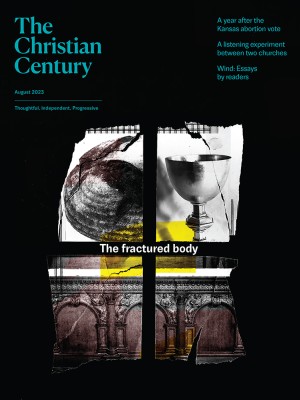It’s me, Margaret’s mom
Judy Blume’s gift to the world is her insistence that young people can be trusted as capable moral agents.

Photo by Dana Hawley / Lionsgate
Collapsing back on her twin bed in her overcrowded apartment room in 1970s Manhattan, Margaret Simon (Abby Ryder Fortson) utters the first prayer of her life, beseeching God to stop the move her parents have just announced. Or failing that, “Don’t let New Jersey be too horrible.” So begins Are You There God? It’s Me, Margaret (directed by Kelly Fremon Craig), a joyful, insightful movie adaptation of Judy Blume’s beloved young adult novel.
Whether it is New Jersey’s fault or not, the next year of Margaret’s life is filled with rocky transitions that keep her seeking divine intervention. Quickly befriended by her domineering and competitive new neighbor Nancy Wheeler (Elle Graham), she is sucked into the whirlwind of teenage friendship, first crushes, and impending puberty.
Read our latest issue or browse back issues.
Margaret and her best friends both long for and fear the bodily changes of adolescence with the fervor of religious devotees trying to entice and placate a deity they barely understand. They measure their nonexistent bust lines for minuscule changes and buy pads “just for practice.” They steal an anatomy textbook to figure out what a penis really looks like and a copy of Playboy to imagine what their own bodies might turn into. The scientific illustrations do little to inspire desire, and the pornographic illusion ignites frantic despair.
As Margaret stands in a badly lit dressing room trying on her first training bra, her mom, Barbara (Rachel McAdams), asks how it feels. “I can’t wait until I can take it off,” Margaret says, her face betraying her horror that the trappings of modern womanhood are so onerous and disappointing. Still, a faithful acolyte who fervently hopes her actions will be efficacious of the changes she wants to see, she wears the bra every day.
As she waits for her boobs to grow and her period to start, Margaret keeps talking to God. The child of an interreligious marriage—her mom is Christian and her dad is Jewish—she hasn’t been raised in any religious tradition. She seizes on this year of transition to figure out what religion is all about and if it has a place in her life. She attends temple with her grandma and visits different Christian churches with her new friends. She keeps up her conversation with God, sorting out her feelings about a higher power, beginning to think seriously about what kind of person she wants to be and whether she needs religion to get there.
This suggestion—that kids could figure out spiritual and religious ideas for themselves—made the book more dangerous to my own conservative evangelical homeschool community than any frank discussions of pubic hair and tampons. This is why I am one of the few Gen-X women I know who didn’t read the book growing up. I was actively taught that teenage self-discovery was a myth of “secular culture” meant to lead me away from the faith. On the one hand, Christian teens needed to be able to articulate their own beliefs clearly and confidently. On the other hand, any process that might lead to questioning or rejecting those beliefs was a sign of sinful rebellion. Owning your own spiritual journey was fine so long as the results could be predicted.
It is easy to be scornful of this reaction now, but as I tried to parse out what had made this story seem so dangerous to the ex-hippies in my childhood religious community, who were trying to overcome their own parental traumas through Christian discipline in the 1970s and 80s, I kind of get it. Blume’s real insight wasn’t just about the growing pains of puberty or religious exploration. Her real gift to the world was the insistence that young people can be trusted as capable moral agents, with or in spite of their parents’ best intentions. That is still a radical idea—even in progressive communities that shudder at the thought of book banning.
My own parenting communities are just as confused as my parents were about the line between letting your child figure things out for themselves and protecting them from real and perceived dangers. We want to love our children unconditionally and trust them to make decisions on their own. We want them to figure things out and think for themselves. We all also secretly wonder if we could engineer conditions to get it right, whether that means a kid who never repeats our mistakes, makes us proud in front of other parents, wins the college lottery, or escapes on the last life raft off our burning, sinking ship of a world.
Fremon Craig’s film captures the joyful, curious, respectful perspective that has made Blume’s book such a mainstay of contemporary coming-of-age stories because it trusts its middle school protagonists. Perhaps, though, because it was made by a woman who grew up under Blume’s influence, or because I came to the story as a mom and not a teenager, it was Margaret’s mother who lured me into the film. Through small glimpses of her choices as a parent and spouse, we get a sense of Barbara’s own spiritual and moral journey even as, or maybe because, she takes a backseat to Margaret’s story. In a way, she is a promised hope for what Margaret might become, a reminder that growing up doesn’t just happen to you; you can choose to do it well.
At a pivotal point near the end of the movie Barbara smiles nervously at Margaret and says, without rancor or pleading, “Well, you don’t need me anymore” as she gently steps out of the room, promising to stay nearby. If Blume’s novel has been teaching millions of girls for more than five decades that they will be OK inside that room on their own, Fremon Craig’s movie offers a gentle reminder to parents that if we learned anything from Blume’s book, we will be OK on the other side of the door, too.






